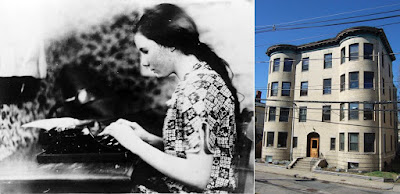 |
| December 15, 2013 |
December 15, 1915 - Last Town Meeting under the old format
December 12, 1928 - Dedication of Temple Ohabei Shalom
December 15, 1972 - Selectman deny Elks liquor license renewal
December 15, 2013 - Dedication of the Brookline Teen Center
December 15, 1915
Last Town Meeting under the old format
Brookline's Town Meeting met for the last time under the old open town meeting format where all eligible citizens -- then men only -- could vote on warrant articles. The town had voted in November to change to a town meeting in which town meeting members are elected by voters to represent their districts in the town's legislative body.
 |
| This map published in the Brookline Chronicle showed the nine precincts created in December 1915 for the change to representative town meeting |
There were few major items in the warrant for this last meeting under the old format. The meeting, reported the
Brookline Chronicle, "was characterized by a small attendance, intelligent debate, a degree of timidity and inclination to temporize, and solutions in the main conservative."
Brookline was the first town in Massachusetts to change from open town meeting to representative town meeting. Read more about the change in
this Muddy River Musings post.
December 12, 1928
Dedication of Temple Ohabei Shalom
Temple Ohabei Shalom, the oldest Jewish congregation in Massachusetts, dedicated its grand new synagogue on Beacon Street in Brookline. It was the second synagogue built in Brookline, joining the Kehillath Israel temple built earlier in the decade.
The congregation, founded in Boston in 1842, built its first synagogue in the South End in 1851. By the 1920s, many of the leaders and members of the congregation had moved to Brookline. Ohabei Shalom built its temple center building, adjacent to the Beacon Street synagogue site, in 1925.
December 15, 1972
Selectman deny Elks liquor license renewal
The Brookline Elks lodge on Kent Street was denied a renewal of its liquor license because of a clause in the national Elks organization restricting membership to whites only. The Brookline lodge had voted with most Massachusetts lodges earlier in the year to support the removal of the clause, but that recommendation had been rejected by the national organization.
A similar denial of a liquor license for an Elks lodge in Maine had been upheld by that state's Supreme Court, but was being appealed to the United States Supreme Court. That court rejected the appeal in April 1973, and the national Elks organization repealed the discriminatory clause later that year.
The Elks lodge building was constructed in the 1840s as the home of Ginery Twitchell, president of the Boston & Worcester Railroad. It passed through several owners who used it as a rental property from the 1880s to 1966 when it was purchased by the Brookline Elks club. The building, sold to a developer in 2021, is now under threat of demolition.
December 15, 2013
Dedication of the Brookline Teen Center
The Brookline Teen Center was dedicated with a grand opening as the culmination of an eight-year effort to provide a place for local teens after school. The development of the center, in a former automobile garage, was led by then-Brookline High School social worker Paul Epstein. (See the before and after pictures at the top of this post.)
The new center included a gym, a studio for yoga and aerobics, a game room, a classroom, a small stage, and a social recreation room with pool and foosball tables. Local teens were actively involved in the design of the $3.7 million center, which was funded through private fundraising.
The initial design of the center retained some elements of the old auto garage, including an auto body repair sign on the wall and yellow parking space markings on part of the floor.



















